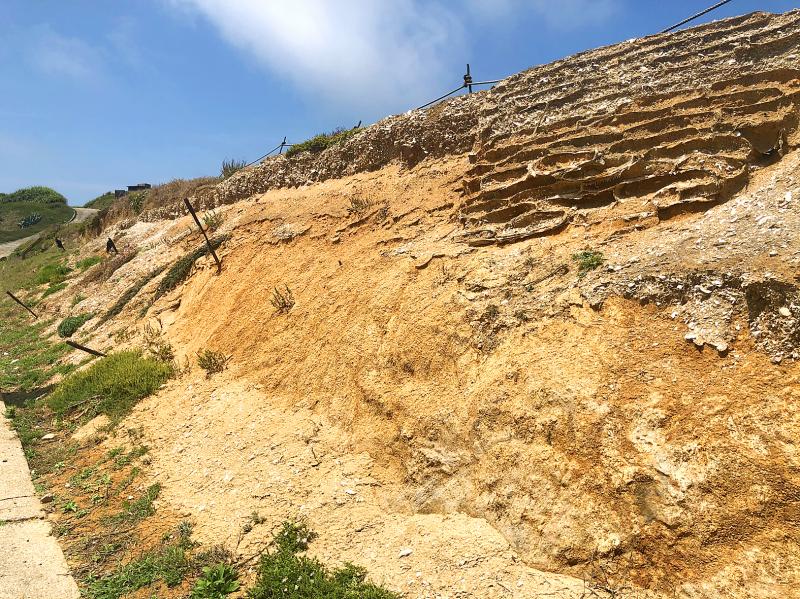An archeological site on Lienchiang County’s Liang Island (亮島) has become Taiwan’s 11th National Archeological Site, the Ministry of Culture said yesterday.
Liang Island is the northeastern-most island in Beigan Township (北竿), and the site includes four locations known as Daowei I, Daowei II, Daowei III and Daowei IV, the ministry said.
They are on the northeastern tip of the island, which is known as Daowei (島尾), it said.

Photo courtesy of the Ministry of Culture via CNA
Collectively known as the Liangdao Daowei Archeological Site, they date to 7,000 to 8,300 years ago, the ministry said, citing surveys.
This makes them one of the earliest Neolithic sites within the nation’s jurisdiction, it said.
The site’s location near a cliff makes it relatively rare, while the ecological environment there is unique, the ministry said.
The site also shows significant differences from sites on Taiwan proper, it said.
Then-Lienchiang County commissioner Yang Sui-sheng (楊綏生) in 2011 discovered remnants of shell mounds while attending an event on the island, after which archeologist Chen Chung-yu (陳仲玉) conducted a survey and began excavation work, the ministry said.
A considerable number of pieces of pottery, stoneware and bone tools have been excavated from the site, it said.
Researchers have also unearthed two tombs with human skeletal remains preserved in fairly good condition, it said.
The specimens — identified as a male and a female — have been named “Liangdao Person No. 1” and “Liangdao Person No. 2” respectively, it said.
They are believed to have lived more than 600 years apart, the ministry said.
The ministry is to also cooperate with the local government to carry out activities to promote cultural heritage education and the preservation of the site, it said.

Temperatures in northern Taiwan are forecast to reach as high as 30°C today, as an ongoing northeasterly seasonal wind system weakens, the Central Weather Administration (CWA) said. CWA forecaster Tseng Chao-cheng (曾昭誠) said yesterday that with the seasonal wind system weakening, warmer easterly winds would boost the temperature today. Daytime temperatures in northern Taiwan and Yilan County are expected to range from 28°C to 30°C today, up about 3°C from yesterday, Tseng said. According to the CWA, temperature highs in central and southern Taiwan could stay stable. However, the weather is expected to turn cooler starting tonight as the northeasterly wind system strengthens again

Foreign travelers entering Taiwan on a short layover via Taiwan Taoyuan International Airport are receiving NT$600 gift vouchers from yesterday, the Tourism Administration said, adding that it hopes the incentive would boost tourism consumption at the airport. The program, which allows travelers holding non-Taiwan passports who enter the country during a layover of up to 24 hours to claim a voucher, aims to promote attractions at the airport, the agency said in a statement on Friday. To participate, travelers must sign up on the campaign Web site, the agency said. They can then present their passport and boarding pass for their connecting international

COOLING OFF: Temperatures are expected to fall to lows of about 20°C on Sunday and possibly 18°C to 19°C next week, following a wave of northeasterly winds on Friday The Central Weather Administration (CWA) on Sunday forecast more rain and cooler temperatures for northern Taiwan this week, with the mercury dropping to lows of 18°C, as another wave of northeasterly winds sweeps across the country. The current northeasterly winds would continue to affect Taiwan through today, with precipitation peaking today, bringing increased rainfall to windward areas, CWA forecaster Liu Pei-teng (劉沛滕) said. The weather system would weaken slightly tomorrow before another, stronger wave arrives on Friday, lasting into next week, Liu said. From yesterday to today, northern Taiwan can expect cool, wet weather, with lows of 22°C to 23°C in most areas,

Taiwan sweltered through its hottest October on record, the Central Weather Administration (CWA) said yesterday, the latest in a string of global temperature records. The main island endured its highest average temperature since 1950, CWA forecaster Liu Pei-teng said. Temperatures the world over have soared in recent years as human-induced climate change contributes to ever more erratic weather patterns. Taiwan’s average temperature was 27.381°C as of Thursday, Liu said. Liu said the average could slip 0.1°C by the end of yesterday, but it would still be higher than the previous record of 27.009°C in 2016. "The temperature only started lowering around Oct. 18 or 19